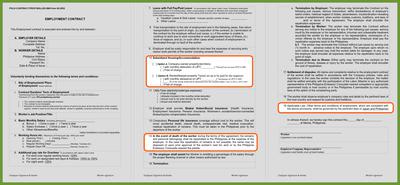| Tweet |
OEC concerns: Issues raised by Japanese companies against requirements by POEA and POLO in Tokyo, Japan
by Mark Esco
(Tokyo, Japan)
One of the many steps to get an OEC is for the Japanese company/employer to sign and agree with POLO's "POEA Standard Employment Contract".
My employer/company, which employs 150 Japanese and International employees, has not agreed to some of this contract's conditions. I am the only Filipino in this company. Our HR has been in contact with POLO and has tried to discuss it with them, specifically with Winnie of POLO Tokyo.
Unfortunately, POLO would come back and say to the Japanese company "just comply" and will not go beyond this process.
We have spoken to 3 other Japanese companies regarding this contract and all of these companies said, "No Japanese company would sign this contract - some of the conditions are not even in line with the Japanese labor laws and does not protect the Japanese company as well"
These conditions in the contract are some of the main concerns of Japanese companies:
1. Subsidized Housing/Accommodation (#10)
Even though some company provides this as a great benefit to all OFWs, some Japanese companies do not and could not provide this – especially if they do not provide this benefit to any of their other employees (both Japanese and international). So, it leaves some OFWs with legally obtained working visas stuck because companies would not agree to this.
2. Repatriation / In the event of death of the worker (#14)
The Philippine government is the only country that is demanding the employer to be responsible for financing an OFW's repatriation. This is our government’s responsibility, and we know that ever since Covid OWWA & POEA’s budget is being stretched but most Japanese companies strongly disagree with this and again have made some OFW stuck.
3. Applicable Law: (#19)
Due to the wording of #19 on the contract. Japanese companies with Japanese lawyers are reluctant to sign the contract as they do not know and are not specialists in the Philippines’ general law and labor law.
Just like any foreigner in the Philippines, they are bound to follow the law of the country they are in, not the law that they came from. They think that "If a company/foreigner is in the Philippines, that company/foreigner should be bound by the laws of the Philippines" and if a company/foreigner is in Japan, that company/foreigner should be bound by the laws of Japan".
So a company in Japan should not be bound by both Japanese and Philippine laws – it should only be Japanese laws.
It may sound good and makes sense to have the line "shall be governed by the pertinent laws of both Japan and Philippines".
But from the side of the Japanese companies who are thinking about risk mitigation, to quote them verbatim
"Japanese labor law helps and protects all employees. We know our law (Japan) but we do not know the whole Philippine law and this does not protect our company in the event of unforeseen lawsuits in the future".
Again, this has left some OFWs stuck in the process as some companies would not agree to this.
----
There may be a workaround for some OFWs and that they were able to obtain their OEC. Unfortunately, each OFW and each company has unique/different circumstances – some companies may agree to the contract because it is favorable to them, but this does not mean all Japanese companies can or will agree to it (because there is uncertainty, or it would be unfavorable to them).
We wished for these points to be raised and if other people have a solution to this. We would really appreciate your advice.
There are other concerns for some such as the required agency, difficult processing, and document-related issues, but we appreciate being able to share our own personal concerns that may be similar to others.
Thank you very much.
Join in and write your own page! It's easy to do. How? Simply click here to return to OFW Stories.
Like this page?
| Tweet |




